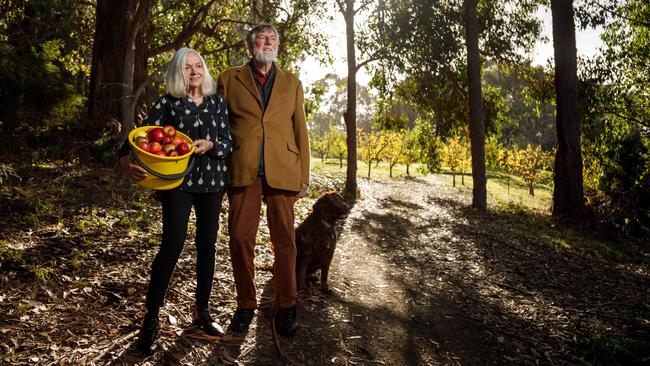Curtin University/Making Work Absolutely Human: what makes you happy
Earning more does not always make you happier, but location and job type will.

Most full-time employees will spend more than 100,000 hours of their adult lives at work and research undertaken by Curtin University for think tank Making Work Absolutely Human has identified what matters most to Australian workers, including how satisfied they are in their role.
MWAH chief executive and co-founder Rhonda Brighton-Hall says researchers studied what makes a person happier at work, from education levels to gender, hours worked, their job sector, flexibility, size of their organisation and where people live.
Unhappy workers lead to lower productivity, higher turnover and poor culture, and Brighton-Hall says knowing what is most important to Australian workers can help companies retain staff, improve workplace environments and lift performance.
“We wanted a study on what really matters to people, what makes you happy and satisfied at work,” Brighton-Hall says.
The research, which used the most recent data from the federal government’s Household Income and Labour Dynamics in Australia longitudinal survey, has surprising elements including that while a high level of pay is important to many, the more a person is paid the more dissatisfied they are likely to be with their job security, long work hours and inflexibility.
Workers who were very satisfied with their hours earned an average of $1176 a week, those who were simply satisfied earned $1264 a week, and the not-so-satisfied bunch earned $1277. The most dissatisfied with their flexibility, or lack of it, earned $1402 a week.
If they owned a small business, the long hours were less of an issue because they had autonomy.
“We intuitively know that working long hours is bad for you and it leads to poor family life but no one talks about it, it’s almost as if it’s ‘don’t talk about the war’,” Brighton-Hall says.
“People also want autonomy. The people feeling they’re working long hours and have their hand on their phone on the weekend and answering it on the beach, there’s no autonomy in that. But people who have a small business, they can do that and work long hours but as long as they have autonomy and know the people they’re working with, that’s OK.”
Everyone these days wants flexibility, but the most satisfied workers were those who did only a small amount of work from home, at 31 per cent, and 15 per cent were dissatisfied because it encroached on their family lives.
A surprising element, Brighton-Hall says, is that those with the highest levels of education were often the most dissatisfied as well, with workers who obtained a Year 11 qualification or below the happiest. Of workers with a postgraduate degree, 23 per cent were very satisfied with their job, compared with 34 per cent with the lowest qualifications and those who had not finished high school.
The inverse relationship is surprising, Brighton-Hall says, because schools have spent the past decade telling students they will earn more and be more successful the higher their education levels.
“We had a lot of conversations while working on this, that if you’re at university and get superior qualifications, and say ‘I’m going to do this great work and have an impact’, but that might not happen for a long time,” she says. “If it’s not great work, it’s a double whammy of people feeling they wasted their time to get a job which they don’t like.”
Brighton-Hall says it is significant that those most satisfied were likely to work for a not-for-profit organisation because they felt their contributions mattered; they were either in the youngest cohort or the oldest — with life dissatisfaction declining and coinciding with workplace happiness as they aged and peaking again closer to retirement; and they were women working part time.
They were also likely to be in regional areas with less stress associated with travel times, lower housing costs, a community atmosphere and good relationships.
The most satisfied were community and personal service workers, at 35 per cent; clerical and administration staff (32 per cent); managers (30 per cent); and labourers. The least happy were sales staff, tech workers and professionals.
Of the industries, Brighton-Hall says agriculture, forestry and fisheries came out on top, followed by arts and recreation, education and training, and electricity, gas, water and waste workers.
Tasmanian apple orchardist Lynne Uptin, 72, fits the picture of the most satisfied worker nationally. She is a retired arts administrator who works part time growing apples and making cider in an agricultural industry, lives in a regional community outside Hobart and has flexibility.
Uptin moved from Sydney to Tasmania with her husband, scientist Clive Crossley, and three children in tow in 1984 in search of a lifestyle change.
After setting up an arts school she “drifted” into Arts Tasmania and directed the organisation for 19 years while renovating a Georgian house on a large property with “nothing on it but the sheep grazing to the door”.
“The community here is wonderful, (Tasmania) gets very bad press but it’s not my view of the world,” Uptin says. “It’s a rich arts scene down here, there’s a huge science community and my husband is a scientist. We have a huge garden club here and it’s a lovely group of people who are very kind and would do anything if something went wrong.”
Uptin moved into agriculture when she officially retired in 2007, thinking the Apple Isle was the perfect place to make cider — which few growers were doing.
She is happy working the orchard through the seasons, with a view to Bruny Island and producing beautiful fruit.
Brighton-Hall says the Uptin example, and other findings from Curtin’s research, can be used by organisations to understand how they can improve working environments, along with other advice they offer on dealing with issues from workplace bullying to career coaching and managing conflict.


